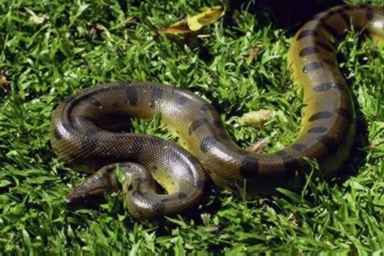|
| Query: tapir | Result: 104th of 105 | |
Green Anaconda (Eunectes murinus) - Wiki
| Subject: | Green Anaconda (Eunectes murinus) - Wiki
| |

| Resolution: 384x256
File Size: 17003 Bytes
Upload Date: 2007:09:20 18:57:41
|
Green Anaconda
From Wikipedia, the free encyclopedia
[Photo] Eunectes murinus, green or common anaconda. By he:User:?????????? or Taragui (http://he.wikipedia.org/wiki/User:%D7%9E%D7%AA%D7%A0%D7%99%D7%94). | Permission is granted to copy, distribute and/or modify this document under the terms of the GNU Free Documentation License, Version 1.2 or any later version published by the Free Software Foundation; with no Invariant Sections, no Front-Cover Texts, and no Back-Cover Texts. A copy of the license is included in the section entitled "GNU Free Documentation License". |
The Green Anaconda (Eunectes murinus) is an anaconda. It is the largest member of the boa family of snakes and the most heavy bodied member of the super-order Squamata.
Description
It is among the largest snakes in the world, with recorded (but unverified) measurements of 9.45 m (29.7 feet) and 11 m (33.5 feet), though average size is closer to 31 feet. It rivals the Reticulated Python for length, but is typically considerably heavier. It can weigh 250 kg (551 lb) and have a girth of more than 30 cm (11.8 inches) in diameter. The Green Anaconda might be the most exaggerated animal on earth in terms of size, with reports of lengths ranging up to 40 m (131 feet). Probably the largest snake ever actually measured was a shot-but-not-killed female near the Colombia-Venezuela border in 1944. This unweighed giant was measured as being 11.43 m (37.5 feet), before it apparently slithered off from its hunter, who thought it died. Females are significantly larger than males, having the largest sexual dimorphism of all the snakes.
Their primary overall color is an olive green, with black blotches that run the length of the body. Their head is narrow compared to the rest of the body, with most exhibiting distinctive orange-yellow striping on either side. Their eyes are set high on their head so as to allow the snake to be able to see out of the water without exposing the rest of its body.
Geographic range
Green Anacondas are found mainly in northern South America (Amazon and Orinoco basins), in Venezuela, Colombia, Brazil, northern Bolivia, northeast Peru, Guyana, and the island of Trinidad.
Behavior
Green anacondas, like all anacondas, are primarily aquatic. They eat a wide variety of prey, almost anything they can manage to overpower, including: fish, birds, a variety of mammals, and other reptiles. Particularly large anacondas may even consume large prey such as tapir, deer, capybara, caiman, and sometimes crocodiles and jaguars, but such large meals are not regularly consumed. They employ constriction to subdue their prey. Cannibalism among green anacondas is also known, most recorded cases involving a larger female consuming a smaller male. Scientists cite several possible reasons for this, including the dramatic sexual dimorphism in the species and the possibility that female anacondas require additional food intake after breeding to sustain their long gestation period and the male simply being an opportunistic prey item, but the exact reason is not understood. In captivity, anacondas are known for their aggressive disposition.
Reproduction
Anacondas are ovoviviparous. Copulation takes place during the rainy season, typically in the water. Gestation is approximately 6 months. Litter size averages 20-40 young, but as many as 100 are possible. Sexual maturity is reached between 2 and 3 years of age.
http://en.wikipedia.org/wiki/Green_Anaconda
| The text in this page is based on the copyrighted Wikipedia article shown in above URL. It is used under the GNU Free Documentation License. You may redistribute it, verbatim or modified, providing that you comply with the terms of the GFDL. |
|
Comments |
|---|
| | Guest |
|
| I think this informatiON MAKES THIS A VERY INTERESTING ANIMAL. |
| | ass hole |
|
| this sucks |
| | ass hole |
|
| this sucks |
| | ass hole |
|
| this sucks |
| | ass hole |
|
| this sucks |
| | Guest |
|
Scientific Name: Eunectes murinus (Linnaeus, 1758)
Common Names: Anaconda, Green Anaconda, Water Boa, Große Anakonda [German]
Synonyms:
Boa aquatica Wiedneuwied, 1824
Boa gigas Latreille, 1802
Boa murina Linnaeus, 1758
Boa scytale Linnaeus, 1758
Eunectes barbouri Dunn & Conant, 1936
Eunectes gigas Beebe, 1946
Eunectes murinus gigas (Latreille In Buffon, 1801)
Eunectes murinus murinus Duellman, 1978 |
^o^
Animal Pictures Archive for smart phones
^o^
|
|
|